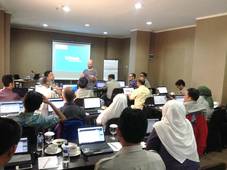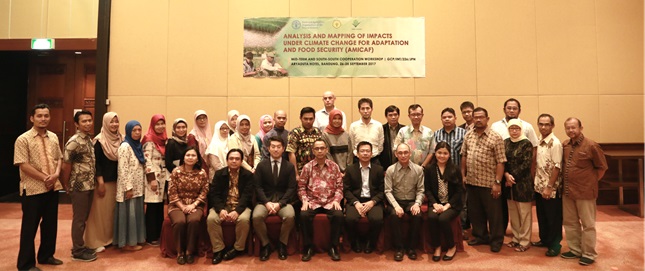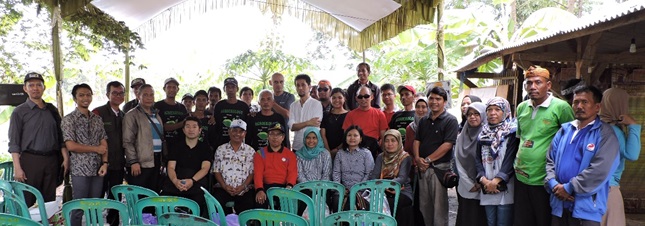Indonesia
 Indonesia is the largest archipelago country in the world by area and population. Agriculture is the main source of employment in rural areas, where poverty is most prevalent. Climate change is threatening food security in Indonesia so managing climate risks is imperative.
Indonesia is the largest archipelago country in the world by area and population. Agriculture is the main source of employment in rural areas, where poverty is most prevalent. Climate change is threatening food security in Indonesia so managing climate risks is imperative.
Since November 2015 FAO has worked in partnership with the Indonesian Agency for Agricultural Research and Development (IAARD) the Department of Agriculture, and other government agencies through AMICAF. All four components of the AMICAF approach are being implemented.
Workshops
Final workshop January 2018
Final workshop January 2018
AMICAF Indonesia’s final workshop was held on 18 January 2018, in Bogor, Indonesia. Those attending the workshop included policy makers from the Ministry of Agriculture, experts from national research institutes, BMKG (Indonesian Agency for Meteorology, Climatology and Geophysics), the FAO Representative in Indonesia, and the FAO AMICAF team.
All the local research teams made excellent presentations highlighting valuable policy implications which will be useful for follow-up research in Indonesia as well as policy planning.
Based on the findings made by these research teams, recommendations covered:
- The development and improvement of watershed infrastructure
- Certified seeds
- Adaptive superior varieties of seed
- Balanced organic and inorganic fertilizers
- Agricultural machinery
- Cropping calendar arrangements
- Improved access to climate information

Mid-term workshop September 2017
Mid-term workshop September 2017
The AMICAF Indonesia’s mid-term workshop was held 26-27 September 2017 in Bandung, Indonesia. The objectives of the workshop were:
- Present and compare findings with the AMICAF project in the Philippines and the preliminary findings of AMICAF project in Indonesia.
- Exchange experiences and lessons learned from the 1st phase of the project implementation to better improve the ongoing project.
- Engage in the South to South Cooperation (SSC) framework by gathering all related experts from Indonesia and the Philippines.
- Oversee the planning and implementation of AMICAF Indonesia, as well as its policy interactions.
35 people including experts from the Philippines who were trained in AMICAF’s 1st phase participated in the workshop.
In addition, a one day field visit to Indramayu was organized on 28 September 2017. Aside from the workshop participants, more than 50 farmers and local government officials attended the event, including heads of sub districts, and representatives from the local Agency of the Ministry of Agriculture.
BMKG (Indonesian Agency for Meteorology, Climatology and Geophysics), an AMICAF partner agency, is working in this area pioneering farmer groups to jointly develop a module on climate change adaptation options at field level. This module will also refer to the mid-long term projections produced by AMICAF and is expected to be used nationwide.
Crop modelling training May 2017
Crop modelling training May 2017

AMICAF organized a crop modelling training in Indonesia from 8-10 May and on the 12 May 2017 with the Ministry of Agriculture (MoA) and Indonesia’s Meteorology, Climatology, and Geophysics Agency (BMKG) in Bogor.
The training introduced a team of experts to crop modelling, so they had the skills to conduct yield simulation under future climate change and technological progress scenarios. They did this using WABAL (crop specific water balance model) which is the industrial version of FAO's AgroMetShell.
Following an opening speech from the Indonesian Center for Agricultural Land Resources Research and Development (ICALRRD) representative and an overview of the AMICAF project, the training sessions began. The sessions consisted of hands on practice guided by a trainer to ensure that all participants could operate and understand the concept of crop modelling.
The modelling was based on three selected crops rice, maize and soy bean. Not all participants will work in crop modelling but understanding data production and its analysis is important for those involved in making policies related to land use planning and food security.
Hydrology modelling training May 2017
Hydrology modelling training May 2017

The Hydrology Modelling training introduced the concept of hydrology through various geographic information system (GIS) instruments, such as QGIS, a cross-platform free and open-source desktop GIS application, Google Earth as well as MOSAICC’s STREAM module for analysis.
The aim of the training was to enhance Indonesian experts’ skills to simulate the discharge rate in large catchment areas, to estimate water resources under future climate conditions. The training started with a brief presentation about the concept of hydrology. This was followed by practical sessions introducing the participants to Google Earth and QGIS.
Through the training, the participants became familiar with Hydrology Modelling and data analysis using the West Java, Cimanuk Basin as a pilot. They also used precipitation data from the previous training on crop modelling to simulate water discharge and calibration.
Climate downscaling training March 2017
Climate downscaling training March 2017

FAO AMICAF organized a statistical climate downscaling training in Indonesia from 6-10 March 2017. Staff of the Meteorology, Climatology, and Geophysics Agency (BMKG), the Indonesia Agro-climatology and Hydrology Research Institute (IAHRI), the Indonesian Center of Agricultural Socio Economic and Policy Studies (ICASEPS), and the Indonesian Center of Agricultural Land Resources Research and Development (ICALRRD) participated in the training. The trainer came from the University of Cantabria, Spain and used the Statistical Downscaling Portal (SDP) developed by the Santander Meteorology Group and Predictia as the main computational facility.
The Modeling System for Agricultural Impacts of Climate Change (MOSAICC) is a system of models to support each step of impact assessment, from climate scenario downscaling to economic impact analysis at national level. As a first step in the modelling sequence, climate downscaling holds a very important role in providing projection data to be used for Hydrology and Crop modelling. This helps in the analysis of vulnerability to food insecurity and its impact on the economic sector. Statistical climate downscaling was chosen due to its ability to provide long term projections, with less computational effort required compared with other methodologies such as dynamical downscaling.
On the first day there were presentations on the AMICAF project and an introduction to climate modelling and the downscaling methodology. The other training days focused on hands-on practice in groups. The final objective was to generate a set of downscaled climate projections (up to 2 070) for precipitation and maximum and minimum temperature for twenty two selected stations across Java. On the last day of the training, each group presented the results.
Inception workshop and 1st technical workshop November 2015
Inception workshop and 1st technical workshop November 2015

At the project’s inception workshop there were 20-30 participants including the Executive Secretary, the Indonesian Agency for Agricultural Research and Development Secretariat (Secretariat of IAARD), the FAO Representative in Indonesia, the Assistant Representative in Indonesia, and a representative of the donor (Ministry of Agriculture, Forestry and Fisheries of Japan).
Participants stated that the inter-ministerial Project Steering Committee (PSC) is the managing body of the activities in Indonesia and that the National Project Coordinator (NPC) will be the government contact person.
On the 12th November the technical workshop for component 1 and component 2 were organized in Bogor. The climate and agricultural situation in Indonesia, analytical methodology, data availability, time scale analysis as well as linkages between research and policy in Indonesia were discussed.



